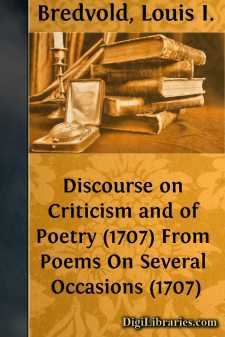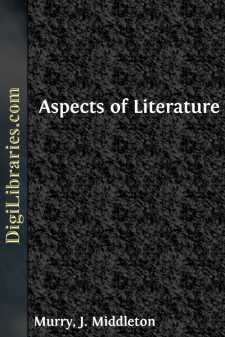Literary Criticism
- American 18
- Ancient and Classical 3
- Asian 1
- Australian & Oceanian 1
- Books & Reading 8
- Caribbean & Latin American 2
- Drama 2
- English, Irish, Scottish, Welsh 49
- European 7
- General
- Horror 1
- Humor 2
- Jewish 2
- Medieval 2
- Middle Eastern 3
- Poetry 7
- Renaissance 6
- Russian & Former Soviet Union 1
- Shakespeare 27
General Books
Sort by:
The Problem of a Preface A peculiar difficulty arrests the writer of this rough study at the very start. Many people know Mr. Bernard Shaw chiefly as a man who would write a very long preface even to a very short play. And there is truth in the idea; he is indeed a very prefatory sort of person. He always gives the explanation before the incident; but so, for the matter of that, does the Gospel of St....
more...
by:
John Jay Chapman
EMERSON I "Leave this hypocritical prating about the masses. Masses are rude, lame, unmade, pernicious in their demands and influence, and need not to be flattered, but to be schooled. I wish not to concede anything to them, but to tame, drill, divide, and break them up, and draw individuals out of them. The worst of charity is that the lives you are asked to preserve are not worth preserving....
more...
Introduction What little is known of the life of Samuel Cobb (1675-1713) may be found in the brief article in the Dictionary of National Biography by W.P. Courtney. He was born in London, and educated at Christ's Hospital and at Trinity College, Cambridge, where he obtained the degrees of B.A., 1698, and M.A., 1702. He was appointed "under grammar master" at Christ's Hospital in 1702...
more...
by:
Arnold Bennett
WILFRED WHITTEN'S PROSE 4 Apr. '08 An important book on an important town is to be issued by Messrs. Methuen. The town is London, and the author Mr. Wilfred Whitten, known to journalism as John o' London. Considering that he comes from Newcastle-on-Tyne (or thereabouts), his pseudonym seems to stretch a point. However, Mr. Whitten is now acknowledged as one of the foremost experts in...
more...
JOSEPH CONRAD "Under all his stories there ebbs and flows a kind of tempered melancholy, a sense of seeking and not finding...." I take the words from a little book on Joseph Conrad by Wilson Follett, privately printed, and now, I believe, out of print. They define both the mood of the stories as works of art and their burden and direction as criticisms of life. Like Dreiser, Conrad is forever...
more...
CHAUCER March 17, 1894. Professor Skeat's Chaucer. After twenty-five years of close toil, Professor Skeat has completed his great edition of Chaucer. It is obviously easier to be dithyrambic than critical in chronicling this event; to which indeed dithyrambs are more appropriate than criticism. For when a man writes Opus vitæ meæ at the conclusion of such a task as this, and so lays down his...
more...
The Function of Criticism It is curious and interesting to find our younger men of letters actively concerned with the present condition of literary criticism. This is a novel preoccupation for them and one which is, we believe, symptomatic of a general hesitancy and expectation. In the world of letters everything is a little up in the air, volatile and uncrystallised. It is a world of rejections and...
more...








